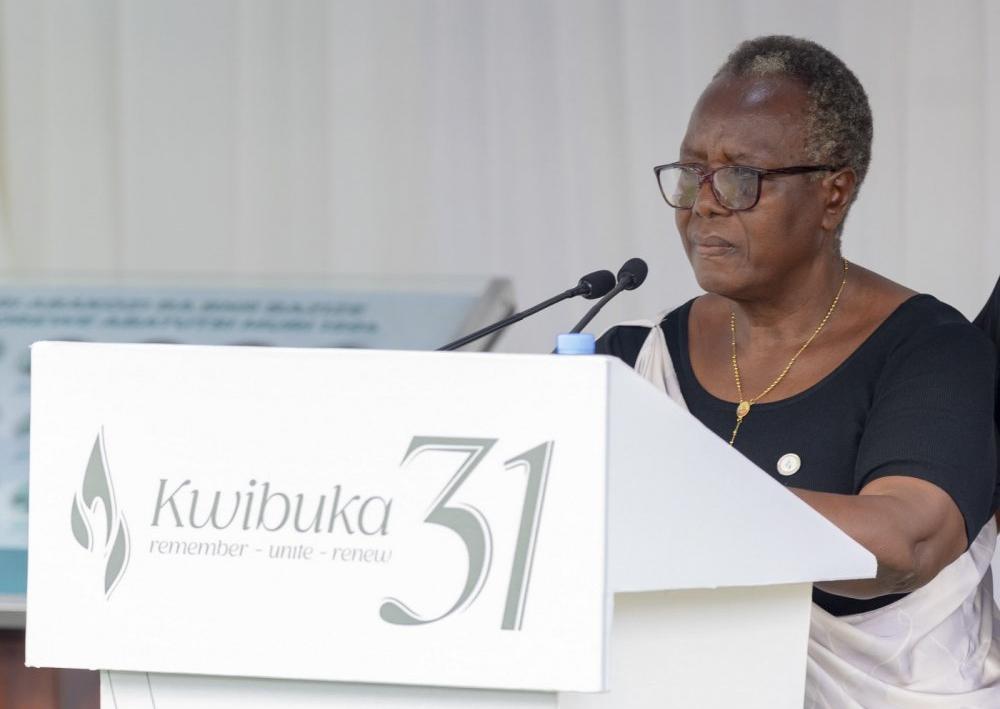Africa-Press – Rwanda. When Marie-Ignâce Uwimana’s entire family was slaughtered during the 1994 Genocide against the Tutsi, she wished death would take her too. But she was left to carry the unbearable weight of survival, alone.
When the Genocide began, Uwimana lived in Nyabisindu in Kigali, with her husband, Tharcisse Ayirwanda, who was an employee of the Central Bank of Rwanda, alongside their three children and one adopted child. All were murdered during the genocide, leaving Uwimana as the sole survivor.
“It was early April, I don’t remember the exact date, when a female soldier from the neighborhood, along with Interahamwe, came to our house. When no one answered, they smashed the windows and shouted that the ‘cockroaches’ had fled to the CND [the Parliament building],” Uwimana, now aged 73, recalled as she shared her at the commemoration of National Bank of Rwanda employees who were killed in the Genocide.
Later that night, around 11pm, more attackers arrived, this time accompanied by workers from the National Bank. “They tore down the fences, burst through windows and doors. My children and I hid in the corridor, while Tharcisse hid behind the fridge.”
The attackers discovered Uwimana and the children but hadn’t yet found her husband. “They asked me where Tharcisse was. When I said I didn’t know, they demanded to see the guns they claimed our relatives they called cockroaches had given us. I told them we had none, and that made them even more furious.”
She said how one man poured petrol on them and prepared to set them alight.
“He struck a match, but our neighbour, an Interahamwe militiaman himself, kicked it away before it could ignite. Then, as they went about stealing our belongings, and he covered us with a large coat and smuggled us outside.”
Uwimana added that they fled to a neighbour’s house, but were turned away, and they decided to hide in banana trees.
Tragically, her husband was spotted when he was in the door leaving the hiding spot.
“They beat him with sticks, cut him, and threw him into a soak pit we were building,” she said.
“He screamed from 11am throughout the night. The next morning, one of the looters said to me, ‘you Tutsi, your husband is finally dead.’”
With her children, Uwimana fled toward Kibagabaga. It was near her home, but due to constant threats and stress, it took them a day and a half. There, they encountered others in hiding, but even there danger lingered.
“One morning they lined us up, ready to kill us,” she said.
“They started slaughtering and beating people. Just before they reached us, they heard gunfire and fled. But they returned later and lined us up again and they took away one teacher, and we fled into a bush. It was too small to hide us. We were like the bird hiding the head while all the back was visible.”
After enduring rain in the bush, they moved again, this time to Kimironko to seek shelter. But what awaited them there was more horrifying than what they had passed through.
“We found a house, and then came men, about 40 years old, and took young girls outside. Among them was my 15-year-old daughter and our adopted girl. They raped them and told us, ‘We got what we needed. We’ll be back tomorrow.’”
The next morning, Interahamwe militias arrived and forced the group to carry their belongings. “They told us we would be the sofa of Habyarimana during his burial,” Uwimana said of the President who had been killed in a plane crash on April 6.
They were taken to Nyanza-Kicukiro and shown a field of corpses. “As we stood there, we heard more gunfire. Someone said the Inkotanyi were at Rebero, and we hoped to escape, but we were surrounded.”
During the chaos, Uwimana lost track of her youngest child. “My daughter ran off. Later, I learned she had found my sister and gone to stay with my cousin.”
However, safety was fleeting. Her cousin’s wife was not happy to host them and she asked them to leave. The child was eventually returned to Uwimana in the forest. They were recognised by an Interahamwe militiawoman called Dativa , who said they still had ‘some work to do.’
The attackers killed others in the group, but Uwimana was spared. “Dativa told me, ‘You won’t die. But staying alive after your whole family has been killed is a worse punishment,’” she recollected.
Uwimana believed her children were dead. “The killers took them away and later came back with only their clothes and shoes. That’s when I knew they were no more.”
Devastated, she roamed the streets, hoping to be killed. “But even when the Interahamwe militiamen passed by, no one bothered. I was 70 kilograms before, but at that time, I had dropped to 40. There’s no pain like being left alone.”
She thanks the RPF Inkotanyi for stopping the Genocide. “I thank God for guiding them,” she said.
Although she got support from the central bank, Uwimana said more survivors need to be given a hand to be able to live a decent life.
For More News And Analysis About Rwanda Follow Africa-Press






